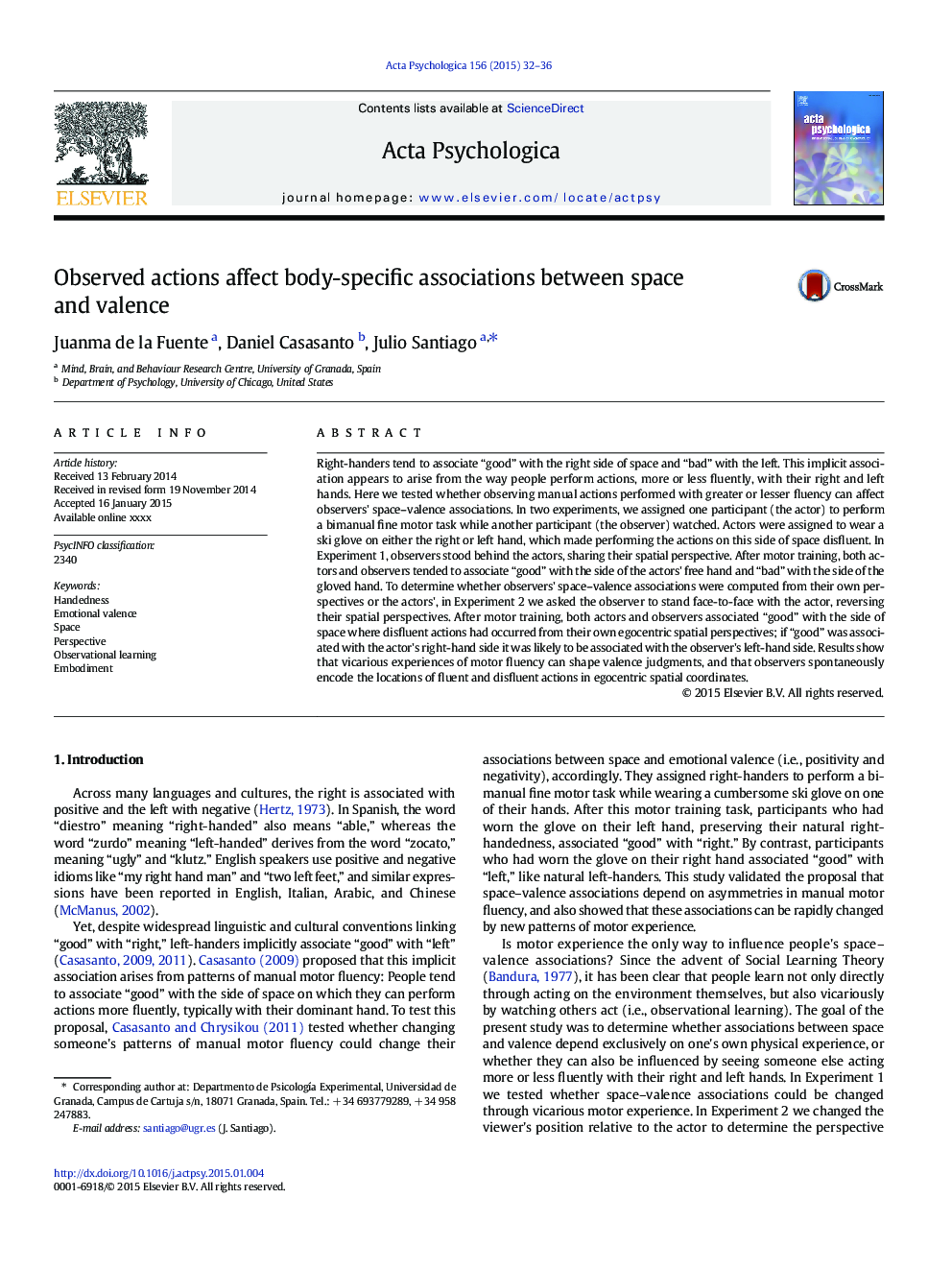| کد مقاله | کد نشریه | سال انتشار | مقاله انگلیسی | نسخه تمام متن |
|---|---|---|---|---|
| 7277428 | 1473602 | 2015 | 5 صفحه PDF | دانلود رایگان |
عنوان انگلیسی مقاله ISI
Observed actions affect body-specific associations between space and valence
ترجمه فارسی عنوان
اقدامات مشاهده شده بر ارتباطات خاص بدن بین فضا و سلطه تأثیر می گذارند
دانلود مقاله + سفارش ترجمه
دانلود مقاله ISI انگلیسی
رایگان برای ایرانیان
کلمات کلیدی
2340، دستیابی، ولنتاین احساسی، فضا، چشم انداز، یادگیری بصری، تجسم،
ترجمه چکیده
راست دستها تمایل دارند که "خوب" را به هم پیوند بزنند با سمت راست فضا و یک بدا ؟؟؟ با چپ این رابطه ضمنی نشان می دهد که از نحوه انجام اقدامات، بیشتر یا کمتر، با دست راست و چپ آنها بوجود می آید. در اینجا ما آزمایش کردیم که آیا رعایت اقدامات دستی که با رعایت بیشتر یا کمتر انجام می شود، می تواند بر انجمن های فضای غلط ناظر تأثیر بگذارد. در دو آزمایش، ما یک شرکت کننده (بازیگر) را برای انجام یک کار حرکتی دوجانبه خوب در حالی که یکی دیگر از شرکت کننده (ناظر) تماشا کرد. بازیگران برای پوشیدن یک دستکش اسکی بر روی دست راست یا چپ قرار داده میشوند، که انجام اعمال در این قسمت از فضا را از بین میبرد. در آزمایش 1، ناظران در پشت بازیگران ایستادند و دیدگاه فضایی خود را به اشتراک گذاشتند. پس از آموزش موتور، هر دو بازیگر و ناظر تمایل داشتند که «خوب» را به هم متصل کنند با دست دست بازیگران و بته؟ با طرف دست دستکش. برای تعیین اینکه آیا انجمن های فضایی ناظر ناظران از دیدگاه های خود و یا بازیگران محاسبه شده است، در آزمایش 2 ما از ناظران خواسته است که با بازیگر روبرو می شوند و دیدگاه های فضایی خود را تغییر می دهند. پس از آموزش موتور، هر دو بازیگر و ناظر در ارتباط با یک "خوب" با سمت فضا، جایی که اعمال نفوذ از دیدگاه فضایی خودسوزی خود رخ داده است؛ اگر خوب؟ با سمت راست بازیگر همراه بود، احتمالا با سمت چپ ناظر همراه بود. نتایج نشان می دهد که تجارب حاکم بر رانندگی موتور می تواند قضاوت های ارزشمندی را شکل دهد و ناظران به طور خود به خود مکان های اقدامات روان و مبهم را در مختصات فضایی انحصاری رمزگذاری می کنند.
موضوعات مرتبط
علوم زیستی و بیوفناوری
علم عصب شناسی
علوم اعصاب شناختی
چکیده انگلیسی
Right-handers tend to associate “good” with the right side of space and “bad” with the left. This implicit association appears to arise from the way people perform actions, more or less fluently, with their right and left hands. Here we tested whether observing manual actions performed with greater or lesser fluency can affect observers' space-valence associations. In two experiments, we assigned one participant (the actor) to perform a bimanual fine motor task while another participant (the observer) watched. Actors were assigned to wear a ski glove on either the right or left hand, which made performing the actions on this side of space disfluent. In Experiment 1, observers stood behind the actors, sharing their spatial perspective. After motor training, both actors and observers tended to associate “good” with the side of the actors' free hand and “bad” with the side of the gloved hand. To determine whether observers' space-valence associations were computed from their own perspectives or the actors', in Experiment 2 we asked the observer to stand face-to-face with the actor, reversing their spatial perspectives. After motor training, both actors and observers associated “good” with the side of space where disfluent actions had occurred from their own egocentric spatial perspectives; if “good” was associated with the actor's right-hand side it was likely to be associated with the observer's left-hand side. Results show that vicarious experiences of motor fluency can shape valence judgments, and that observers spontaneously encode the locations of fluent and disfluent actions in egocentric spatial coordinates.
ناشر
Database: Elsevier - ScienceDirect (ساینس دایرکت)
Journal: Acta Psychologica - Volume 156, March 2015, Pages 32-36
Journal: Acta Psychologica - Volume 156, March 2015, Pages 32-36
نویسندگان
Juanma de la Fuente, Daniel Casasanto, Julio Santiago,
